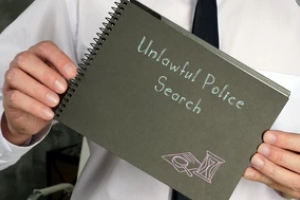 One of the most common interactions that police officers engage in with members of the public is searches, frequently of a vehicle. If an officer pulls you over and requests to search your vehicle, or if the officer conducts a search anyway, you may be wondering why the event occurred and whether your compliance was mandatory.
One of the most common interactions that police officers engage in with members of the public is searches, frequently of a vehicle. If an officer pulls you over and requests to search your vehicle, or if the officer conducts a search anyway, you may be wondering why the event occurred and whether your compliance was mandatory.
Some police searches are warranted and fully legal; however, officers may also unlawfully search your property under the guise of probable cause. If you suspect that you were a victim of an unlawful search, you have options.
Why Citizens Are Protected From Unlawful Search And Seizure
The Constitution of the United States imparts critical freedoms to individuals, and one of the most well-known is the “right of the people to be secure in their persons, houses, papers, and effects, against unreasonable searches and seizures.”
This right is conferred by the Fourth Amendment, and it seeks to ensure that people cannot be searched on a whim and their possessions seized without reason. This same amendment also stipulates that in order for a search to occur, the person doing the searching must demonstrate probable cause or acquire a warrant that describes not only what is being searched for but where to locate it. Encoded in each person’s constitutional rights is the protection against unlawful or unreasonable searches and seizures, which is why an officer who violates this right can be held liable.
What Constitutes Unlawful Search And Seizure?
Understanding the difference between lawful and unlawful searches requires clarifying some of the nuance that goes into this type of interaction. For a search to be legal, an officer must demonstrate that he or she possesses a search warrant (which was issued as a result of probable cause).
Alternatively, an officer may conduct a search if there is reason to believe that important evidence is being destroyed or that a crime is clearly being committed in plain sight at that moment. The issue arises in the fact that the officer does not actually need to be correct about these “exigent circumstances” (or, in other words, circumstances that are occurring at that moment that must be immediately dealt with). Thus, officers may claim that exigent circumstances forced a search, even if they are not correct.
Thus, an unlawful search and seizure is when a search is conducted without probable cause. 42 U.S. Code, Section 1983 protects the public from this behavior and is the origin of a civil rights claim in this type of circumstance. Additionally, an officer may be conducting an unlawful seizure if they force a traffic stop to continue in order to call a drug-sniffing dog without reasonable suspicion.
Can You Sue For Being Unlawfully Searched?
 The short answer is that yes, you can file a lawsuit for unlawful search and seizure. However, it is important to reach out for legal counsel as soon as possible after the incident, because cases such as these can rely heavily on each party’s recounting of the event. Your lawyer can help you to craft your case carefully to demonstrate that the officer did not have probable cause to search you or force you to stay.
The short answer is that yes, you can file a lawsuit for unlawful search and seizure. However, it is important to reach out for legal counsel as soon as possible after the incident, because cases such as these can rely heavily on each party’s recounting of the event. Your lawyer can help you to craft your case carefully to demonstrate that the officer did not have probable cause to search you or force you to stay.
Possible Outcomes In Your Case
Those who are successful in proving that an officer unlawfully searched them may be awarded compensation. Settlements can range significantly in amount, from a few thousand dollars into the six figure range.
Additionally, repeated offenses by the same department can produce department-wide change that may help to reduce the further occurrence of unlawful searches and seizures. However, proving that an officer did not possess reasonable suspicion, especially when they make claims about exigent circumstances, can pose a particular challenge.
This is why you should seek the services of an attorney focused on civil rights as soon as you are able after the incident. Be sure to write down as much as you remember, but do not embellish; your testimony is your most valuable asset in a case of unlawful search and seizure, and if it is not honest, your entire case may be called into question.
Work with A Civil Rights Attorney For Your Unlawful Search Lawsuit
If you believe that you have been a victim of unlawful search and seizure at the hands of a police officer, you have options. The attorneys at The Brown Firm would be happy to speak with you and help you to understand what next steps may be possible in your case, including the potential for a lawsuit. Reach out to schedule a consultation with a civil rights attorney today so that you can seek compensation and achieve the justice that you deserve.

